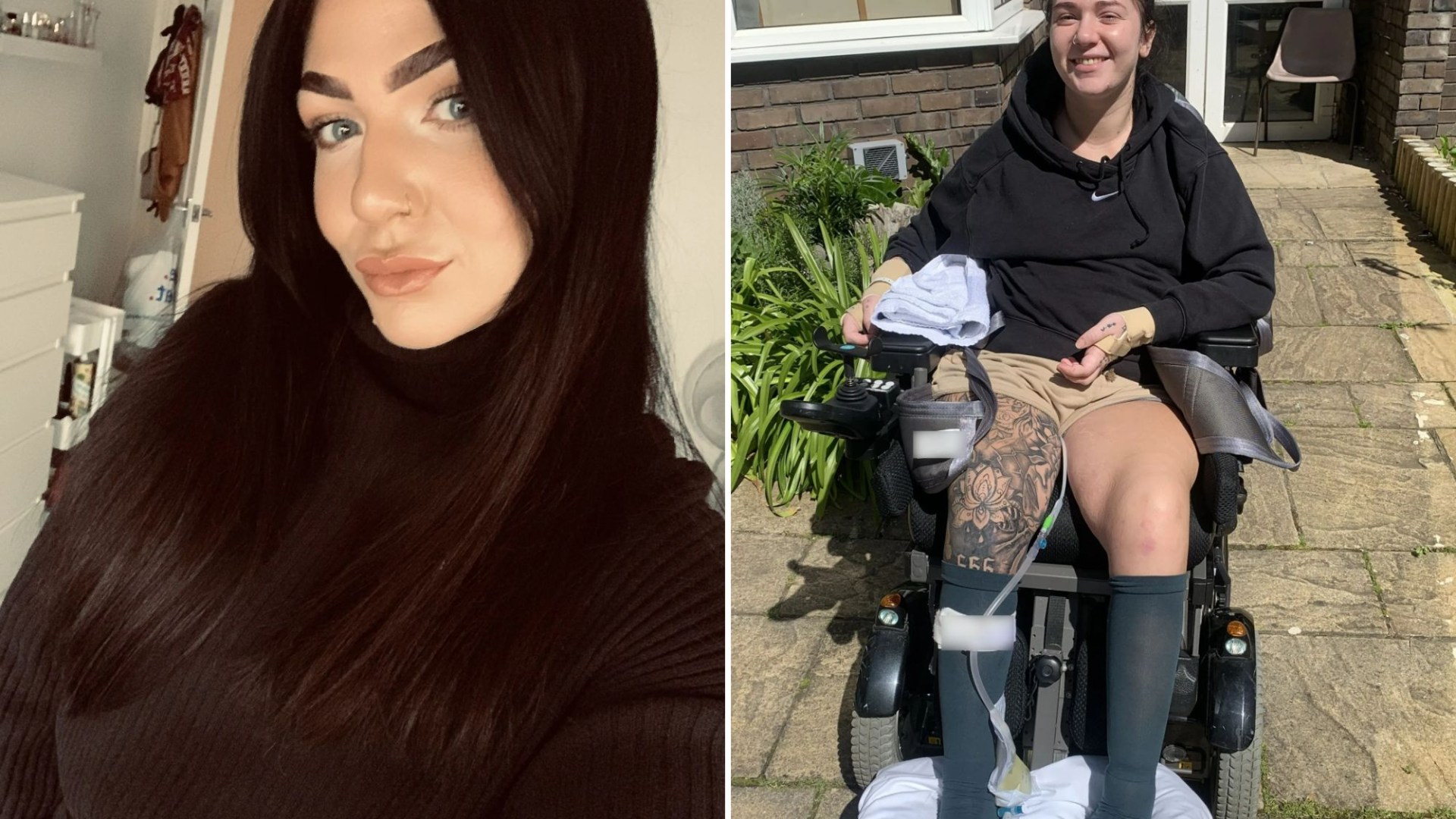A BUSY mum thought the housework had finally got the better of her when she collapsed during a frantic cleaning spree.
But Cherrie Austin, 28, woke up 10 days later from a coma to find she was paralysed.
10

10

10
Cherrie admits that her big cleaning days are a “lot of hard work” and she sometimes “exerts herself too much”.
The 28-year-old had just finished hoovering, putting the washing on and changing her bedding in February when she started to feel dizzy and went to lie down.
However her partner Jonny Morcam returned home from work to find Cherrie lying on the floor of their bedroom “surrounded by sick”.
The next thing she remembers is waking up from a coma, paralysed.
Jonny, 37, had carried her downstairs from their first floor flat in Weymouth, Dorset, asking a stranger to help him put Cherrie into the car because she was “like dead weight” and kept “screaming” in pain.
Eventually an ambulance rushed her to Dorchester hospital, where an x-ray revealed Cherrie had a collapsed lung and the doctors “had no idea what had happened”.
I remember lying down because I was feeling a bit dizzy and that was my last memory before I woke up from my coma
Cherrie Austin
The mum-of-three was then induced into a coma on 25 February, intubated to help her breathe and given a feeding tube.
Cherrie’s family and close friends were called to the hospital to say goodbye to her as doctors feared she “wouldn’t make it through the night”.
After nine days of being in the coma, she miraculously woke up – but she was paralysed from the neck down having suffered a spinal stroke.
Similar to strokes that occur in the brain but much less common, spinal strokes occur when blood flow to the spine is blocked due to a clot or bleed.
Disruption in the blood supply can cause injury or damage to tissues and can block messages travelling along the spinal cord.
The mum was told she would not be able to breathe on her own again.
But Cherrie kept fighting, able to have her intubation tube removed after 13 days and learning how to breathe independently again.
Now she is even learning to wiggle her toes and hopes to keep making strides in her recovery that are leaving doctors baffled.
LAST MEMORY
Cherrie said: “When I go on my cleaning spells I’m running around the house like a headless chicken and it was a lot of hard work.
“That day I had woken up, it was just like every other day. I started cleaning around my house, I wasn’t working so I got all my nail stuff out and thought I’d give myself a bit of a pamper.
“I remember lying down because I was feeling a bit dizzy and that was my last memory before I woke up from my coma.”
Feeling dizzy wasn’t a rare occurrence, Cherrie explained.
“I have really low blood pressure. Sometimes if I exert myself too much then I get a bit dizzy and I have to sit down.
Sometimes it almost feels like you’re trapped in your own body or your own head because you can’t get that frustration out
Cherrie Austin
“A couple of months leading up to it I had had severe back pain and I kept going to the doctors but my doctor put me in with a nurse practitioner who told me that it was just a pain spread disorder.
“I thought I had laid on the bed but my partner found me on the floor, so we’re all still a little bit confused as to what happened.”
Cherrie said her body swelled up while she was in hospital and she became unrecognisable.
“It wasn’t like looking at me, apparently I was all swollen up. My nan came to visit me but she couldn’t bear it so she ended up walking out.
“Nobody knew what to do, it’s not something you experience every day.”
UNCERTAIN FUTURE
Before this Cherrie trained four to five times a week as a boxer on top of her daily gym sessions, as well as coaching one-to-one boxing sessions and self-defence classes at MMAX gym in Dorchester.
It was a hobby she started three years ago and she even previously held the UBBF southern area title.
Cherrie, who is mum to daughter Iyla, 11, and five-year-old twins Willow and Franklin, said: “If I had a bad day or I was finding things difficult or I was struggling then I would go to my boxing session.
“Now I don’t have any of that [since the stroke]. I don’t have my gym, I don’t have boxing.

10

10
“It’s really frustrating, before this I was at the gym everyday. Not being able to do any of that has just been tough.
“Sometimes it almost feels like you’re trapped in your own body or your own head because you can’t get that frustration out.
“I don’t know what my future looks like or what my recovery looks like, what I’m going to get back, what I won’t have, how long it’s going to take.”
The boxer suffers from Ehlers-Danlos Syndrome, a condition that affects her muscular system and joints, causing her to have hyperflexibility and “really tight muscles”.
The syndrome causes her neck to extend further forward and backward than most people and Cherrie said doctors thought over a period of time this could have put pressure on blood vessels, causing the spinal stroke.
SMALL VICTORIES
Cherrie has been at home for two months now following a three-month stay in hospital where she began her physio – she even had visits from her rottweiler puppy Brena during this time.
She has days where she is “in pain constantly” and suffers “severe spasms”.
The mum of three has also lost control of her bowels and bladder.
Subtle signs of a spinal stroke
A SPINAL STROKE occurs when blood supply to the spinal cord is cut off, usually from a clot.
Symptoms depend on which section of the spinal cord is affected.
The severity of the symptoms depends on how much damage is done to the spinal cord.
In most cases, people will get sudden and severe neck or back pain before or during a spinal stroke.
Other main symptoms of spinal stroke are:
- Muscle weakness in the legs
- Unusual feelings in the lower half of the body, such as numbness, burning or tingling or feeling like a tight band has been drawn around the torso – this is the point at which the blood supply to the spinal cord has been disrupted
- Problems with the bowel and bladder – incontinence or needing to go to the toilet with increased urgency
Muscle weakness in the legs can progress to a complete loss of movement (paralysis) very quickly.
People might also experience muscle spasms.
Spinal strokes are a rare condition, accounting for 1.25 per cent of all strokes.
Source: Brain & Spine Foundation
Now, her partner Jonny is caring for her full time.
Although the pair met only a year ago through his work as a tattoo artist, they “clicked right away” and only spent time apart when Cherrie was admitted to hospital.
However, nearly five months on, Cherrie has regained the use of her neck, some arm movement, the use of her right thumb and forefinger.
She is now even able to wiggle her toes – so she remains hopeful she can continue to make big steps in her recovery.

10

10

10

10

10




